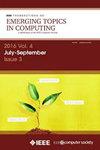DECC: Delay-Aware Edge-Cloud Collaboration for Accelerating DNN Inference
IF 5.4
2区 计算机科学
Q1 COMPUTER SCIENCE, INFORMATION SYSTEMS
IEEE Transactions on Emerging Topics in Computing
Pub Date : 2024-06-07
DOI:10.1109/TETC.2024.3404551
引用次数: 0
Abstract
Deep neural network (DNN)-enabled edge intelligence has been widely adopted to support a variety of smart applications because of its ability to preserve privacy and conserve communication efficiency. The dilemma is that DNN models can be too large to be deployed on computationally constrained edge devices, and the volume of raw data can be too large to be efficiently transmitted to a centralized server. Thus, it is of utter importance that edge devices and cloud servers collaborate with each other to achieve fast and dependable model inference. Current collaborative solutions separate the DNN into two parts, which are placed and executed at the edge and in the cloud, respectively. However, these separated parts are executed consecutively, and all subsequent layers have to wait for the output of the previous layer even if they are not directly connected, causing significant inference latency. We propose a delay-aware edge-cloud collaboration (DECC) algorithm to reorganize the execution of DNN layers. By dividing DNN into several independent branches and selecting the optimal partition points, we apply a pipeline approach to parallelize the execution of these branches to minimize the inference delay. Extensive experiments show that the DECC outperforms existing methods by significantly reducing inference latency and improving throughput.DECC:面向加速 DNN 推断的延迟感知边缘云协作
深度神经网络(DNN)支持的边缘智能因其保护隐私和保持通信效率的能力而被广泛应用于支持各种智能应用。问题在于,DNN模型可能太大,无法部署在计算受限的边缘设备上,而原始数据量可能太大,无法有效地传输到集中式服务器。因此,边缘设备和云服务器相互协作以实现快速可靠的模型推断是非常重要的。目前的协作解决方案将深度神经网络分为两部分,分别放在边缘和云中执行。然而,这些分离的部分是连续执行的,并且所有后续层即使没有直接连接也必须等待前一层的输出,从而导致严重的推理延迟。我们提出了一种延迟感知边缘云协作(DECC)算法来重组深度神经网络层的执行。通过将深度神经网络划分为几个独立的分支并选择最优的分区点,我们采用管道方法并行化这些分支的执行,以最小化推理延迟。大量的实验表明,DECC通过显著降低推理延迟和提高吞吐量来优于现有的方法。
本文章由计算机程序翻译,如有差异,请以英文原文为准。
求助全文
约1分钟内获得全文
求助全文
来源期刊

IEEE Transactions on Emerging Topics in Computing
Computer Science-Computer Science (miscellaneous)
CiteScore
12.10
自引率
5.10%
发文量
113
期刊介绍:
IEEE Transactions on Emerging Topics in Computing publishes papers on emerging aspects of computer science, computing technology, and computing applications not currently covered by other IEEE Computer Society Transactions. Some examples of emerging topics in computing include: IT for Green, Synthetic and organic computing structures and systems, Advanced analytics, Social/occupational computing, Location-based/client computer systems, Morphic computer design, Electronic game systems, & Health-care IT.
 求助内容:
求助内容: 应助结果提醒方式:
应助结果提醒方式:


